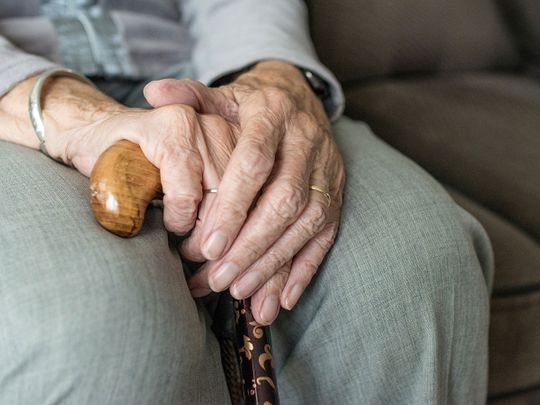
My mother has vascular dementia. Her brain, damaged from a slow decline in circulation, has left her with memory loss.
At 81 years old, she can climb stairs and sign her name. Knitting has fallen away, as has her use of a spoon. She can count hay bales in the field but will want to eat grain out of the horse’s bucket.
She speaks in sentences using a perfect pitch and emotion. While the words are real, they are far from correct.
From 1988 to 2003 my mother worked at the University of New Hampshire [in the United States] as an administrator in the Thompson School, an agriculture and life science college within the university. In the evenings, she worked in her studio, carving barred owls, chickadees, finches and eagles from chunks of wood.
My mother was open with me, sharing her tears and angst at being left so suddenly. We had many years of conversations about love, loss and ways to cope
She knew every bird call, every feather, their feeding and flight patterns. When the dementia worsened, those words left, migrating elsewhere.
In the beginning, in 2015, she knew she was dying. She was at first angry, then resigned. In the car she asked me: “How can I die? Can you help me die? Why am I losing my mind?”
Hands on the wheel, I told her I had no plan. As her mind began to abandon her, those questions ebbed.
My mother and I cut our teeth on my father’s death. In 1975, he died on a surgery table after a car accident. A young driver swerved into our lane. We were in the car with him and unharmed; he had a ruptured spleen that prompted a fatal heart attack.
He was 39 years old. I was 14. My mother was 37. I am their only child. My father’s death was the lens through which I saw every aspect of my young life. I learned to appreciate the meditative qualities of knitting, of running, of being alone in a rural field, screaming in rage.
My mother was open with me, sharing her tears and angst at being left so suddenly. We had many years of conversations about love, loss and ways to cope.
'We are loved'
“We are not struggling through life alone,” she told me. “We are loved.”
In the late 1990s, my husband built an apartment addition onto our house where my mother has lived for decades. Next to the horse paddock she planted beds of perennial flowers and rows of shrubs to attract birds.
The tomatoes she grew and canned fed us throughout the winter. She sewed dress-up clothes for my children — sequinned capes and tulle skirts — and saddle pads for each horse with their initials embroidered on the side. She drove cautiously, with snow tires in the winter.
Now my mother has no sense of consequences, no boundaries. When, in the time before the coronavirus, we saw young children at church, she would try to make them laugh, their squeals joining to interrupt the sermon. When we are at a bakery, she lunges at the basket of rolls and grabs as many as she can fit in her hands.
Sometimes we will fold laundry together, dumping the mix of sheets and socks on the kitchen table. If I run upstairs to put the clothes away, she will get up from the table and dart to the pantry, breaking off one banana after another. Sometimes she eats three bananas in quick succession.
Ten minutes later she will look at the remaining few of the bunch and ask, “Can I have one of those?”
On the best days, her behaviour is amusing. Her laugh is so easy and contagious. She is effervescent and finds joy in the smallest places.
My mother hasn’t cried in four years; tears are my release. When she sways to a Dolly Parton song and tilts her head up, I sob for the person she was. Seeing this, she holds and comforts me; I feel an emotional connection.
Minutes later she will point at the shadow moving across the wall and laugh, saying, “I wonder what that is?”
Five years into her dementia, she is active and engages with life, even if the specifics of it are lost.
Lessening my depression
I began photographing my mother in April 2018. Joni Sternbach and Mary Ellen Bartley, two artist friends, suggested that my depression might be lessened if I made work.
I picked up my iPhone and found a patch of morning light in the living room. She blossomed, turning her face to the sun, pulling her shoulder in when I gestured for her to slide to the left. She seemed to enjoy the attention and the process. This was a surprise to me.
Now, hundreds of portraits later, she seems willing to try anything. She is happy to take direction and reacts to my reaction. When I am over the moon at the changing light and how her face is framed, she also smiles, happy at my happiness.
My mother doesn’t recognise her reflection, or her own image. Most adults avoid having their picture made. My mother is more childlike in that she has no concern.
With my camera, I document the joy and the light of her last years of life — the ways that she circles back home, even as she is leaving.
— New York Times News Service
Cheryle St. Onge is an artist and educator. In 2009 she was the recipient of Guggenheim Fellowship in photography.








